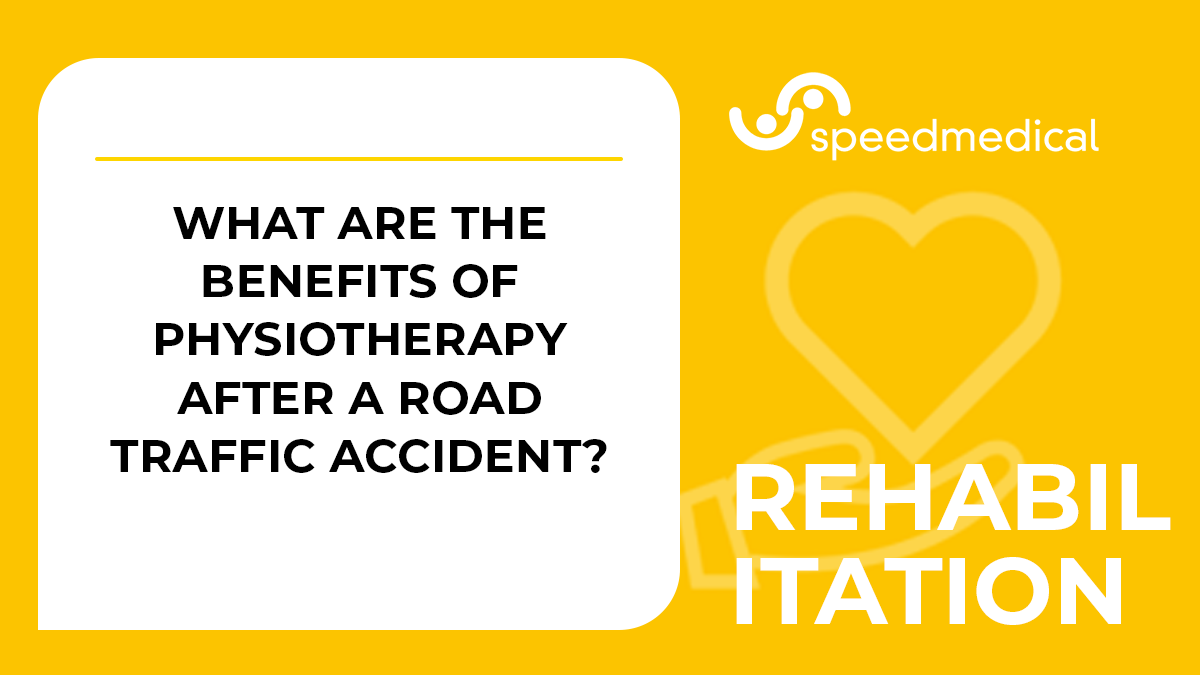
19 Nov 2021
What are the benefits of physiotherapy after a road traffic accident?
Nobody’s ever in a good place in the aftermath of being involved in a road traffic accident, due to the stress and trauma as much as the injuries that those involved might have suffered. By injuries we mean both physical and psychological. But that’s not the end of potential anxieties, as victims of RTA’s try to get their lives back on track.
On many occasions rehabilitation is part of the physical aspect of the short-to-medium term recovery process, and chief among the various healthcare disciplines which are closely associated to rehab, is physiotherapy.
For many individuals who find themselves involved in road traffic accidents, the longer-term symptoms can be debilitating and adversely affect their quality of life. It’s often the case that some injuries may not even manifest until weeks down the line.
While physical injuries indicative of a road traffic accident can be dealt with immediately thereafter, other health, wellbeing and lifestyle-impacting elements may be more enduring and require a programme of recovery. This is where physiotherapy comes to the fore.
Types of injury relating to RTA’s
Physiotherapy can aid recovery after a road traffic accident, offering a host of gradual pain relief mechanisms, simply by adopting specific exercise programmes around your daily life. Whiplash is generally considered one of the most common RTA injuries, and results from the overstretching of soft tissues. With the ligaments, tendons, and muscles near to the neck bearing the brunt.
That’s because of the sudden impact that jolts the human body in the event of a car accident. Typically, whiplash can take several weeks, if not months, to fully recover from. Symptoms traditionally include neck pain, stiffness, and compromised mobility.
Other injuries caused by RTA’s can include herniated disc problems (which can affect the spine more broadly), and knee trauma (blunt force to the knee can cause trauma to the kneecap and ligaments). It’s not just neck, back and leg injuries, of course, however these present as the most recurrent when it comes to rehabilitation which necessitates physiotherapy.
Early physiotherapy intervention after RTA key to recovery
Early intervention is crucial when someone has suffered an injury caused by a road traffic accident. This can promote a prompt recovery, as well as providing reassurance. Together with advice and education in terms of identifying the means of recovery and how best to self-manage the process of rehabilitation in the weeks ahead.
Research indicates that returning to normal activities as soon as is physical and psychologically possible can and does speed up recovery periods. At the crux of the matter lies the re-engaging of the damaged areas which have been on the receiving end of the trauma. Which is the point at which a physiotherapist takes over.
Our physiotherapy experts will ensure your clients are fast-tracked to recovery, post-RTA
Here at Speed Medical we have a panel of physiotherapy experts who can draw on a career populated by first-hand experiences in the profession, along with skill sets learned through qualification. Their wealth of experience can be facilitated once instructed by a solicitor acting on a client’s behalf, in the days following their involvement in an RTA.
With initial assessment reports being created to establish the extent of injuries, validating diagnosis and addressing the prognosis. All as part of the far-reaching medical reporting and rehabilitation services we provide.
To fully comprehend the extent of your client’s injuries and the process required to return them to pre-RTA health, our physiotherapy experts will perform an initial assessment. At this juncture they will ask the patient various questions about their symptoms and how the injury impacts on their daily life, including work. They will also address the subject of their past medical history and any treatments they’ve received to that point.
Physical tests also integral part of initial physiotherapy consultation
The initial assessment will review range of movement, posture, and strength, relating to the damaged area of the body. Reflexes, sensation, and balance issues will also be determined, with a view to formulating a tailored programme to help alleviate the physical extent of difficulties and put them on the road to total recovery.
Methodology for the incremental improvement of a patient’s physical wellbeing post-RTA might include soft tissue massage, joint mobilisation techniques, taping and acupuncture amongst other widely advocated means. But this will be decided then and there, and on a case-by-case basis.
Benefits of physiotherapy after a road traffic accident
Courtesy of receiving physiotherapy, RTA patients can successfully manage, relieve and ultimately, overcome the pain and physical injuries in the fullness of time. The benefits of physiotherapy after a road traffic accident are numerous and can effectively lead to a full recovery when stringently followed. The main advantages are:
- Supports Fast Recovery – Receiving the right physiotherapy in a timely manner hasten a patient’s recovery, by improving strength and flexibility and gradually minimising painful symptoms
- Prevents Long-Term Damage – Physiotherapy also helps prevent further complications, including progressive mobility issues, and chronic pain. The sooner patients start their recovery program, the more likely they are to enjoy a relatively pain-free life
- Alleviates Pain – Physical activity is essential for reducing pain and encouraging recovery. Being physically active enables the body to pump nutrient and oxygen-rich blood to the injured areas
- Could Avoid the Possibility of Surgery – In some cases, patients may require immediate surgery to treat their injuries. However, minor problems may escalate over time, requiring surgery later in life. Physiotherapy can avoid the need for such surgeries by strengthening weakened muscles, ligaments, and tendons
Let Speed’s physiotherapists put your client on the road to recovery
Get in touch with our team at Speed Medical today, where our panel of physiotherapists can prescribe individualised programmes of recovery, including strengthening and stretching exercises to alleviate the pain commonly related to injuries caused by RTA’s. As well as working towards correcting poor body mechanics.




